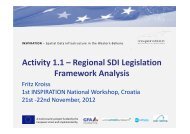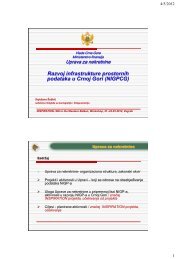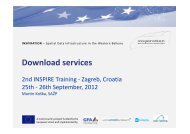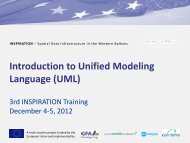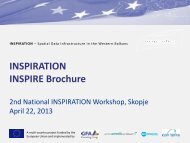MOVE - Moderation and Visualization for Group ... - INSPIRATION
MOVE - Moderation and Visualization for Group ... - INSPIRATION
MOVE - Moderation and Visualization for Group ... - INSPIRATION
Create successful ePaper yourself
Turn your PDF publications into a flip-book with our unique Google optimized e-Paper software.
40<br />
Introduction Introduction of of workshop workshop workshop objectives<br />
objectives<br />
<strong>and</strong> <strong>and</strong> contents<br />
contents<br />
Following the presentation of all people involved,<br />
the moderators will introduce workshop objectives<br />
<strong>and</strong> contents. If the workshop is longer than<br />
one week, you should first introduce the program<br />
<strong>for</strong> the opening week. You should keep the<br />
program board throughout the event as an<br />
external ‘memory’ <strong>and</strong> point of reference, clearly<br />
visible within the plenary room. Every morning,<br />
you should point a red arrow at the next session<br />
<strong>and</strong> topic to be addressed, <strong>and</strong> put it in the<br />
context of where you have been be<strong>for</strong>e <strong>and</strong> where<br />
you will be going next. This will provide a sense<br />
of orientation <strong>and</strong> transparency. Also, you should<br />
keep the objectives board <strong>for</strong> the last session of<br />
the event because, at that time, you may want to<br />
compare your aims with your achievements.<br />
Participants’ articipants’ expectations expectations <strong>and</strong> <strong>and</strong> <strong>and</strong> fears fears<br />
fears<br />
Once you have introduced the program as<br />
planned, you should see whether it meets the<br />
participants’ expectations. Ask them what they<br />
expected when they came to the workshop, pin<br />
the cards to a board <strong>and</strong> compare them to the<br />
objectives <strong>and</strong> program of the event. The<br />
moderator should comment on how the participants’<br />
expectation do or do not match the<br />
planned goals <strong>and</strong> activities. Whenever necessary<br />
<strong>and</strong> possible, the program should be adjusted<br />
according to the aspirations expressed. Additionally,<br />
you may want to find out what should be<br />
done <strong>and</strong> what should be avoided to meet these<br />
expectations during the training. The participants<br />
will list appeals on cards that may result in<br />
a ‘working contract’ or a ‘code of conduct’ which<br />
the participants set <strong>for</strong> themselves <strong>and</strong> the<br />
moderation team. You may refer to these<br />
expectations at later stages <strong>and</strong> when evaluating<br />
the entire event (see Part 5).<br />
Self-assessment Self-assessment of of participants’ participants’ skills<br />
skills<br />
In training events, it is important that participants<br />
assess their own skills <strong>and</strong> competences in<br />
regard to the workshop’s or course’s subject<br />
matter. This will help the training team set<br />
priorities, add to <strong>and</strong> close gaps in the curriculum.<br />
Again, you should keep the board <strong>for</strong> the



